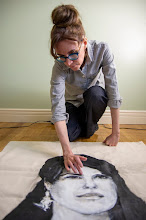“He’s lying. I find that very attractive.” -- Violet Wistler
Sitting in the Westdale Theatre for Damsels in Distress (2011), as part of the Art Gallery of Hamilton’s I Heart Film series, I felt a twinge of irony because I wanted to be rescued. From this movie. Specifically from Violet Wistler (nee Emily Tweeter). Gerta Gerwig plays the self-righteous main character, Violet, whose outreach mission at Seven Oaks University on the east coast involves distributing soap to fraternities and donuts to suicidal students. Her vocabulary harks back to the days of Dawson’s Creek, when a professor friend of mind noticed particular terms seeping into students’ papers in unison, reflecting the improbable diction of Dawson, Joey, Pacey, and Jenn. The only way Violet’s doe-eyed roommate, Heather (Carrie MacLemore), would use the term ‘precocious’ is from hanging around her. Her other roommate, Rose (Megalyn Echikunwoke), is a childhood friend who backs her up consistently, always on the lookout for ‘playboy operators’ and non-suicidal students scamming free baked goods. While applying mascara, she muses, “If humility comes from within and you never had any, where are you supposed to find it? I gave up looking long ago.” Their new rommmate, Lily (Analeigh Tipton), a transfer student, enters their social circle and calls the group’s humility into question, provoking Violet to actually thank Lily for her chastising. She probably is grateful instead of embarrassed, because she would regard the opportunity for increased self-awareness as a gift.
The movie, directed by Wilt Stillman, starts out seeming like it might reverse the ‘damsels in distress’ stereotype. The young women attend a party with the intention of helping frat boys discover their potential under the tutelage of Violet. “There’s enough material here for a lifetime of work,” she remarks as one dude launches himself over a railing. Soon, though, the young women become swept away by young men who cause them to say such ridiculous things as, “He’s lying. I find that very attractive.” Heather dates a colour blind student who becomes panicked by rainbows, Lily falls for a friend whose supposed religion supposedly requires him to express his love physically “from the wrong side” and Violet considers—gasp—going to the library stacks on a date. The male-female dynamic isn’t really critiqued, because the only element that bears any resemblance to modern romance is the ethics of boyfriend stealing, from outright to seemingly unintentional. This female-female issue is not plumbed, as the secondary characters disappear as soon as the newer romance develops. Strangely, aside from Violet, all the characters feel like secondary characters and I found myself not really caring about the fate of their relationships, be they friendships or romances.
It’s also difficult to care about an overbearing character like Violet. At the same time, it’s hard not to respect Violet for rescuing herself from her funk when she is spurned by her beau, a frat boy she chose because he is unrefined. She walks in the rain alone, she sits in a diner alone, she checks into a motel alone (Motel 4 instead of Motel 6 because it’s cheaper and thrift is a virtue), and she dances alone before she dances with a new partner. An odd feminist, she implies that you can really only depend on yourself, even if your self is a fabrication, complete with an alias.
Sunday, June 10, 2012
Subscribe to:
Comments (Atom)
